The Spring 2012 Anime Preview Guide
Carl Kimlinger
Written by native Oregon wetland gnomes, Carl Kimlinger Brand reviews offer the finest in erudite commentary on the most recent anime. Carl Kimlinger founded his Review Company in 2006 after years of hardscrabble living and studying archaeology. Driven by a burning desire to provide readers with only the finest in over-thought opining, he abandoned the harsh but rewarding world of archaeologists-turned-construction-workers for the loose women and cheap thrills of anime reviewing. He burnt out quickly, drowning six months later in a puddle of rum cocktails on a beach in Tahiti. But his legacy of enthusiastically negative reviewing lives on thanks to the like-minded troglodytes of the Carl Kimlinger Review Company. We hope you enjoy the fruits of their only lightly forced labor.

Shining Hearts -Shiawase no Pan-
Rating: 2
Review: Let's number the strikes Shining Hearts had against it before it even started. 1. It's called Shining Hearts. 2. Its sub-title "Shiawase no Pan" means "bread of happiness." 3. It's based off of a role playing game about a fighting baker. 4. Its RPG "party" doubles as a harem. 5. Its director, Itsuro Kawasaki, is a specialist in mediocrity. Frankly the show never had a chance. But even with everything it had against it, it didn't have to be this bad. Rick is a baker on the island of Windaria, a bucolic fantasy paradise. He works at a bakery run by three girls: Amil, Neris and Airy. The bread they all bake is so good that the locals refer to it as "the bread of happiness." One day while gathering ingredients for their magical baked goods, the four wander a little too far into the Elf Forest, a place known for its dangerous beasties. There they meet brusque elf chieftain Alvin and his bubbly sister Lana. Alvin brushes them aside with a warning, but their delicious bread immediately wins over Lana.
It isn't that Shining Hearts is vile or cruel. In fact it has just the opposite problem: it's so sweet and wholesome that it's nauseating. Amil, Neris and Airy are constantly laughing and doting on Rick. Rick is so nice that his niceness pushes aside any trace of personality. Scene after scene beats you over the head with the characters' happiness and Windaria's indulgent peacefulness. It's fluffy and bright and cheerful and phony as all hell. The episode begins with Rick's co-workers sweetly gazing on his sleeping face. The next scene has customers going on about how happy Rick's bread makes them (maybe there's crack in it?). The next has Rick and his female posse handing out leftovers to gap-toothed church orphans. Yes, orphans. A few scenes later they're rescuing a wounded cute-monster by feeding it, yes, more bread. The sugary awfulness of it is unbearable; all the more so for the complete lack of character depth or meaningful plot. The excellent character designs are by bishojo specialist Tony Taka.
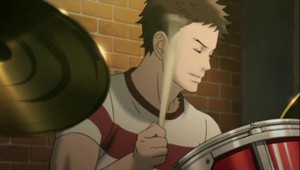
Kids on the Slope
Rating: 4
Review: Quiet, character-based and deliberate, this period piece may be more remarkable for the talent it brings together than for the excitement it'll inspire, but it still deserves to be watched—if only because it's an intelligent, adult series in a perpetually adolescent world. The year is 1966. The Vietnam War is gearing up, Apollo 11 is three years from the moon, and Kaoru Nishimi has just transferred to a new school. Cold, smart and aloof, he's immediately pinned by the locals as a snooty rich-boy honor student. The only classmates willing to speak to him are pretty Ritsuko and her childhood friend Sentarou, a large delinquent whose interest in Kaoru falls somewhere between friendly and hostile. The only things the two boys share are an interest in music—Sentarou in jazz drums and Kaoru in classical piano—and an interest in Ritsuko. Still, their meeting opens Kaoru up, both to the world of jazz and to the potential for friendship.
Kids' creative pedigree can lead to some rather unrealistic expectations. After all it does reunite Cowboy Bebop director Shinichiro Watanabe with queen of anime music Yoko Kanno while throwing in Escaflowne character designer Nobuteru Yuki just for good measure. Rather than blowing minds right out of the gate, though, Kids takes its sweet time establishing characters and relations, telling a simple story with thoroughgoing mildness. There is nothing startling or revolutionary about it. It's simply a good story with good characters told well. The heart of it is Kaoru and Sentarou's relationship, a thorny thing that is too healthy to be called antagonism and too antagonistic to be called friendship. There's humor, often of the deadpan variety (the swing in Kaoru's step after he catches the jazz bug is just killer). There's pathos, mostly in Kaoru's unhappy home life. There's even romance. It's all mild-mannered though, even staid—which isn't unpleasant, but is a surprise coming from Watanabe, a guy whose previous series snarled with inventive energy. Maybe he's mellowing with age. We should all mellow so well.
Kids on the Slope is available streaming at Crunchyroll.

Tsuritama
Rating: 3 ½
Review: Sometimes being weird is enough. Tsuritama isn't immediately fascinating or exciting, but it's strange enough that you'll want to tune in just to see where the heck it's going. Yuki is frequent transfer student with a serious panic attack problem. Any kind of social stress—introducing himself to new classmates, say—triggers a sweating, choking panic that somehow leaves him looking furious at whoever's around. It's quite the social liability. His new school is in a beautiful seaside town, but he's not particularly able to enjoy it. Haru is an alien. Or so he says, and the fact that he can communicate with fish and brainwash people with a squirt gun would seem to bear him out. As would his total ignorance of social norms. They end up transferring into class together and even living together, much to Yuki's consternation, but more importantly they end up fishing together. And somehow this will all lead to Yuki and Haru saving the world. Or so Haru says.
Aliens, fishing, world-saving, and did I mention the Indian prince with the pet duck? Odd is about the only word for it. What possible connection could they have to each other? It certainly makes one curious. Which is good. Because truth be told, the series is too laid back and directionless just now to hook us any other way. Yes, Yuki is one likeable guy, and yes the show can be pretty funny. Yuki's petty panic attacks are less discomfiting than outright laughable. And yes, it looks great. It has a bright, surreal, flat-but-fluid look that fits its overall tone like a glove. But it isn't going to grab anyone by the throat. Especially since Haru's unmitigated ebullience can quickly get annoying. The series' third lead character, a master fisher who affects the kind of irritable apathy that makes adults hate teens, doesn't help things either. Curiosity wins in the end though. The series will do to stick with, at least until we figure out what the hell that prince with the duck is doing.
Tsuritama is available streaming at Crunchyroll.

Medaka Box Episode 2
Rating: 3
Review: Medaka Box's second episode finally explains what the hell a Medaka Box is. Why should anyone care? Because the nature of the box indicates the nature of the series. The Medaka Box is the name given by the students to the suggestion box that Medaka promised when she became student body president. Students put their requests in the box and the student council—namely Medaka and Zenkichi—fulfill them. That the series is named for that box tells you right here and now that the plan is for a mission-of-the-week comedy. And this episode affirms it. There are actually two missions. The first is a mystery of sorts: a member of the track club has been getting threatening letters and recently had her favorite track shoes sabotaged. Who did it? Medaka lines up enough clues to identify the culprit within minutes, who is then terrified and charmed into reforming. The second is a request to find a missing dog. Medaka has problems with animals, so Zenkichi gets the job. Medaka, however, is not happy about the femaleness of his sidekick and decides to intervene.
The formula is clear: student council gets request, humorous complications ensue, Medaka supplies off-the-wall solution, everyone goes home happy. It's not set in stone that the series will cycle the formula every week, but the chances are very, very good that it will. As far as episodic comedies go though, you could do worse. The characters are still good fun, and droll enough that they avoid becoming base romantic comedy stereotypes. Humor is more important just now than action or romance, but is good enough that that doesn't hurt anything. Character growth generally doubles as character humor—be it Medaka's jealousy towards Shiranui, Zenkichi's enthusiastic embrace of fashion, or the amusing truth about Medaka's "animal issue." And the whole dog episode in general is a blast, from the revelation of the beast Zenkichi is up against to Medaka's ridiculous (but fan-friendly!) strategy to capture it. It's less likely than ever that the series will be more than a simple diversion, but it's shaping up to be fun one, so who cares.
Medaka Box is available streaming at Crunchyroll.

Zetman Episode 2
Rating: 2 ½
Review: Zetman irons out some of its pacing and general storytelling issues, producing an episode that proceeds smoothly and relatively professionally, but its need for cheap darkness is still getting in its way. Several years have passed since the end of episode one. Konoha is now a young woman, working at a soup kitchen in her spare time. It's there that she reunites, however briefly, with a grown Jin. Now an underworld bodyguard, Jin has grown into just as feral an adult as he was a child. Kouga in the meantime has become a full-fledged honor student, though his heart still belongs to the pursuit of justice. With the help of his father's engineers, he straps on an assortment of neat gadgets and heads out to thwart evil. Whereupon he butts heads with Jin, also in pursuit of evil—the genetically modified monster kind of evil. Bad things result.
The series' strengths are still in play here: great designs, superior action, cool superhero posturing. Perhaps the action has cooled a little since the first episode, but that's a budgetary reality that can't really be avoided. Taking up the visual slack are Jin and Kouga's tasty adult designs and the superhero coolness that they allow. If you've got a thing for sexy guys in threatening poses, Zetman will feed the need. Added to that, this episode also proceeds in a clean and linear enough manner that its fights (physical and moral) are able to gather some actual force. If only it weren't for the series' burning desire to be dark and edgy, this would be a complete turnaround for the show. Unfortunately, the end of this episode shows every sign that the series is about to trade its one redeeming relationship for a bit of cheap narrative nastiness. Not a good deal. If the next episode seals the deal, there will literally be no reason to keep watching. Darkness and nastiness are fine, but if you leave no reason to endure them then you're just shooting yourself in the foot.
Zetman is available streaming at Viz.com and Hulu.

Nyarko-san: Another Crawling Chaos
Rating: 3
Review: In H. P. Lovecraft's stories, the Cthulhu was an unspeakable, indescribable horror that haunted the collective dreams of mankind. In Nyarko-san, the Cthulhu is a cute girl sent from the stars to protect a pathologically normal guy. That's part of the series' joke, but you still can't help feeling sorry for the departed Mr. Lovecraft. To become fodder for a standard-issue shonen romance...that's just plain humiliating. Not that it's a bad standard-issue shonen romance. Not at all.
Our pathologically normal guy is Mahiro Yasaka. One night he is saved from a demonic-looking beast by a silver-haired beauty who introduces herself as "the chaos that crawls up to you with a smile, Nyarlathotep." Nyarko for short. She quickly explains that she's an alien, one of the many that inspired Lovecraft's tales of horror, that the demon-thing was an interstellar human trafficker, and that she's an intergalactic enforcer sent to protect Mahiro from just such threats. Whereupon she moves into his house and the romantic silliness begins.
Nyarko-san is almost as far removed from its own precursor, the ONA Haiyoru! Nyaruani, as it is from Lovecraft. Where Nyaruani was a refreshingly odd deadpan comedy, Nyarko-san is a hyperactive romantic comedy of the most conventional sort. Mahiro's parents are of course out of town for the foreseeable future, Nyarko of course moves in and of course transfers into his class and of course sneaks into the bathroom to help him bathe. The pace is hectic, the jokes come fast, and you could predict the whole thing with less than half a functioning brain.
That said, within its hyperactive rom-com framework, the series works pretty well. Nyarko is amusingly bonkers, especially in the crazed way she speaks, and the jokes about her Lovecraftian origin are pretty good: She's only in cute girl form because her real form would cost Mahiro a lot of "sanity points" and her horrific origins are hilariously apparent in her sickening fighting style. She's also refreshingly open about her feelings for Mahiro. Would Lovecraft approve? Probably not. But that doesn't mean you won't enjoy yourself.
Nyarko-san: Another Crawling Chaos is available streaming at Crunchyroll.
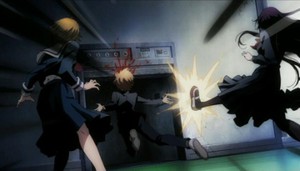
Dusk Maiden of Amnesia
Rating: 2 ½
Review: There're some fun ideas and amusing relationships at the core of this supernatural romantic comedy, but somehow it still manages to be almost totally uninteresting. The Paranormal Investigation Club at Seikyou Private Academy has the dubious distinction of being one of the only such clubs to be run by an actual paranormal phenomenon. The club's president is one Yuuko Kanoe, and she is very dead. She runs the club through Teiichi Niiya, who is the only person who can touch her. One other member, stern Kirie, can see her. The other, easily-spooked Momoe, is totally oblivious. Together the four investigate supernatural occurrences at the school, hoping to unravel the mystery of Yuuko's death.
It's a good concept, having a ghost running a ghost-hunting operation. And the series has some fun with it, especially early in the episode when it shows how the operation looks to spirit-blind Momoe and then replays the whole sequence from Yuuko's viewpoint. The setup also has potential for darker developments, most hinging on how Yuuko died and why she became a ghost. The fact that her body is apparently in the club room is a particularly dark touch. There's something less than light n' fluffy going on with Kirie too, perhaps to do with her last name being the same as Yuuko's.
The real mystery, though, is why none of this ends up being remotely interesting. It may have something to do with director Shin Oonuma, whose typically fine humorous hi-jinks mix uncomfortably with the often beautiful gloom surrounding them. The series looks great, but it looks like a horror anime while acting like a silly romantic comedy. More likely, though, the total lack of attachment is simply because there's no one to attach to. Teiichi could still have his cookie-cutter attached for all the personality he has; Momoe is a ditzy nonentity; Kirie is a prickly cipher; and Yuuko, though stunning, gives us no reason to care about her post-death problems. A few more episodes could change that, but until then the show will be a ghost of what it could have been.
Dusk Maiden of Amnesia is available streaming at Crunchyroll.

Mysterious Girlfriend X
Rating: 2 ½
Review: What the %$&# is wrong with this season? First there was the show about a necrophile, then the one about guns transformed into sexualized little girls. And now it's drool fetishism? Maybe I'll spend the next three months watching reruns of The Waltons. To be fair, Mysterious Girlfriend X actually has an interesting romance at its core, but that damned drool keeps getting in its way.
Young, virgin, and uber-geeky, Akira is your classic shonen romance hero. He's nice enough, but no girl would look at him twice. Well, almost none. Urabe is the class's new transfer student. She's dark and brusque and way strange. The first day of class she talks to no one, sleeps during all of the breaks, and busts out laughing for no apparent reason in the middle of math. She's not exactly Miss Popular after that. One day, after she's left, Akira notices a puddle of drool on her desk. For reasons unknown even to him, he licks it and weeks later falls mysteriously ill. The illness, Urabe tells him, is drool withdrawal.
The romance between Akira and Urabe is a good one. He's a good-hearted though obviously gross nerd; she's a bizarre cipher, complete with audio hallucinations and biological abnormalities. They were made for each other. And they waste no time hooking up. Akira quickly realizes he's in love with her and he confesses in short order. The scene where he does so is sweet, but also appropriately weird: Urabe wants proof of his devotion, but wants it to be unique. No boring old kiss; something only he could do. Which he does, much to her delight.
At which point Urabe vomits up a gallon of drool. That's the series' problem in a nutshell: Interesting people; weirdly touching romance; way too much saliva. It's meant to distinguish the show from other romances, and it certainly works, but it's just so...gross. It's hard to enjoy a teen romance when the guy drinks the girl's drool...every...single...day. Why couldn't the show just trust its romance to distinguish it? It would have worked.
Mysterious Girlfriend X is available streaming at Crunchyroll.
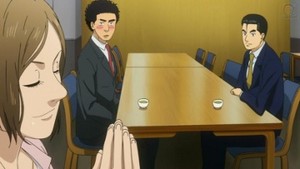
Space Brothers Episode 2
Rating: 4 ½
Review: Space Brothers backs off of the humor a bit in its second episode, opting instead to focus on Mutta's fight to keep his dream alive, both in the face of his own very reasonable adult doubts and the tough tests thrown his way by JAXA. It's less restlessly fun that the first episode, but more than makes up for it in uplift. Mutta is unsure about trying out for the JAXA astronaut position. He knows that even through he got through the preliminary selection, the chances of being one of the final few are slim. As he often did when agonizing over a decision as a child, he visits the observatory of kindly astronomer Sharon. Who once again nurtures him through to the right choice. After which, it's the selection process itself that stands in his way. The first round will be a tough written test, the second a terrifying interview by JAXA mucketey-mucks.
Mutta is great. Not only is he an adult (don't underestimate that; adult anime heroes are like white rhinos—very rare), but he's a good-hearted, realistically troubled, very smart and hilariously odd adult. It's nearly impossible not to root for the guy. So when he debates whether to let his dream die, we want him to keep it alive; when he takes the first test, we want him to pass; when he confronts the JAXA execs, we want them to like him. The show knows this, and plays it for all it's worth. It keeps the tension on through each stage of his journey, and when the tension is released—especially after the paper test, when Mutta celebrates by playing his trumpet high on an evening bridge—the show soars right along with him. Its ability to communicate the terror and joy of throwing yourself after a dream is nothing short of beautiful. As for future episodes, Mutta's fellow examinees—Kenji, a polished guy with a Superman hairdo, and Serika, a very pretty but very strange young lady—already promise interesting things to come. The look that poor, smitten Mutta gives Serika is enough alone to guarantee that.
Space Brothers is available streaming at Crunchyroll.

Upotte!!
Rating: 1 ½
Review: All kinds of inanimate objects and abstract concepts have been turned into anime characters: train stations, countries, pop cans. Now we add assault rifles to that list. Seishou Academy is a school for guns. Quite literally. All of the students there are actually assault rifles. There's FNC, the sweet Belgian automatic. M16A4, the rowdy American rifle. SIG SG550, the fully-automatic Swiss honor student. And L85A1, the compact British space-case. They're all great friends, and also lethal weapons of war. So is everyone else, right down to the teachers. With one exception: their unnamed new homeroom teacher. Thanks to an unspecified mistake, the school hired a normal human to teach them. A normal human of course has no chance in a school full of sentient rifles, and within minutes he's said the wrong thing to FNC, AKA Fuko, and has been blasted straight into the hospital.
The fetish for turning inanimate objects into cute girls or guys has always been kind of creepy, but Upotte takes it to new heights of discomfort. It explicitly sexualizes the use of guns, conflating triggers with vaginas and pulling triggers with...well, you get the idea. Other parts of the gun are assigned to other erogenous zones: the hand-guard is their boobs, the stock is their butt, the bolt is somewhere in their stomach. Funko has a skeleton stock, so apparently that means she wears a thong all the time. L85A1 (AKA Eru) gets stomach aches because her spring is weak and she jams easily. The level of creepiness here cannot be overstated. There's a scene where Funko, feeling that she wants the new teacher to pull her trigger, consults the school nurse who assures her that it's a perfectly natural feeling but that "that part of you is extremely precious, so be sure to keep it clean and well-maintained." And yes, you heard right about Funko and the new teacher: the episode's romantic subplot is all about the sexual tension between a teacher and his middle-school charge. Don't let the adorable art fool you; this is one to avoid all around.
Upotte!! is available streaming at Crunchyroll.

Kuroko's Basketball
Rating: 4
Review: Solid characters, inbuilt conflict, lots of clean thrills--Kuroko's Basketball has everything a good sports show needs, but its decisive advantage is its novel concept: a sports star whose greatness lies in his un-star-ness. The new students are coming in at Seirin High School and the basketball team is out recruiting with all the other clubs. They don't expect too much, but they get two interesting applications. The first is from Taiga Kagami, an enormous slab of very aggressive meat just back from America. His talent is as raw as his personality, and just as intimidating. The second is from Tetsuya Kuroko, though no one actually notices him filling it out. His is interesting because he used to be part of Teiko Middle School's basketball team. Teiko's team was legendary, a collection of towering talents who dominated their division. The problem is that Kuroko stinks. Until he's part of a team, that is.
What Kuroko is, is a passing expert. His skill is in erasing his presence from the court and then facilitating the ball on its way to the players who can put it in the hoop. That's an interesting choice of skill for a main character. When was the last time a sports series had a main character whose defining characteristic was his ninja-like lack of presence? He's actually a lot of fun to watch: a cool, colorless, quietly unflappable boy whose blasé invisibility reflects, not a lack of personality, but a life philosophy. His invisibility is funny, especially when he appears out of nowhere, but is also a conscious choice by a boy of steely will.
Of course, Kuroko isn't the only thing the show has going for it. The rest of the cast is plenty interesting, especially feral Kagami and the team's fearsome teenaged coach Riko. The basketball action is fast and exciting, and the episode builds to Kuroko's display of passing prowess with a skill that bodes well for future excitement. But it's Kuroko, and his mildly creepy symbiotic relationship with Kagami (whom he chooses to be the light to his shadow), that makes the show unique and its future bright.
Kuroko's Basketball is available streaming at Crunchyroll.
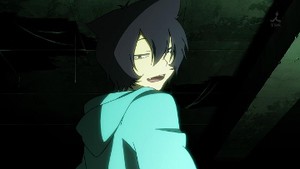
Sankarea
Rating: 3
Review: There are fetishes, and then there are fetishes. Sankarea takes what is essentially a standard romantic setup—a boy and a girl who share a supernatural secret—and puts a seriously sick twist on it. A couple actually. Whether that's a good or a bad thing has yet to be seen, but one thing's for sure: you've never seen an anime romance quite like this.
Chihiro Furuya is a priest's son with a bit of a problem: he wants to know a zombie. Not in the handshake-how-do-you-do sense of the term, but the biblical sense. He's always been that way. His ideal girl has always been dead and a little rotten but still mobile enough to love. Perhaps that's why he has an ancient resurrection spell in the back of his closet. It's while preparing to try the spell on his dead cat that Furuya meets Rea Sanka, the idol of the neighboring girls' school. Rea has her own problems, and was screaming them into a nearby well when Furuya spotted her. The two seem to hit it off; she doesn't even seem to mind that he's a necrophile. But then something goes horribly wrong. Or is it horribly right?
Horribly wrong or horribly right could be our question too. There's no telling just yet if Sankarea will take its potentially nauseating premise in the right direction. If Rea is trying to get closer to Furuya by pretending to be a zombie (yes, she ends up zombified), that would be the right direction. If her dead form isn't too gross, that would be okay-ish too. But the series could just as easily go right off the deep end, especially if sex (gag) or sex and entrails (double gag) enter the picture. And it isn't just the necrophilia that's problematic; there are hints of incest and child molestation in both Rea's wishing-well tirades and the preview that, if played wrong, could end up worse than any corpse-loving.
So will it go right or wrong? My gut says right. This episode is well-made, and there's at least one scene—with Furuya and his sister mourning their dead cat—that displays an encouraging sensitivity. Still, be ready to bail at any time.
 Shiba Inuko-san
Shiba Inuko-sanRating: 1 ½ Review: Shiba Inuko-san is a two-minute show about a high-school girl who looks like a dog. It's actually closer to one minute, what with the opening and other business to be gotten to before and after the episode proper. It isn't a terrible show—Inuko-san is pretty cute and there's one joke that kinda works—it's just that, even at two minutes, it's a total waste of time. Watch a youtube video instead. Same length; better chance of being amused.

Kuromajyo-san ga Tōru!!
Rating: 3 Review: At seven minutes per episode, this is the most substantial of the short-episode series this season, and it shows. It involves an occult-obsessed fifth grader named Choco and the black magician she accidentally summons when she casts a spell while afflicted with a head cold. Having been summoned, Gubid the magician is determined to train Choco in the dark arts—mainly because he (she?) will be sent back to the Spirit World if he doesn't. And so Choco is off on her magical adventure. Which for the first episode involves banishing a vengeful spirit from her school. This being the pleasant, harmless bit of kiddy fluff that it is, the spirit's grudge involves an unwanted nickname and the whole business is resolved by everyone making nice with each other. This is children's stuff through and through, and will mainly appeal to fans who want something innocent and painless to watch.

Yurumates 3Dei
Rating: 2 Review: Yurume Aida, the hero of this three-minute episode, is eighteen and looking to get into college. She looks and sounds about six, but apparently she's eighteen. She's moving into her own place at a complex called Maison Du Wish, which turns out to be a pit occupied by weirdoes. All of whom are examinees, and all of whom have never passed an entrance exam. In fact no one who has ever lived at Maison Du Wish has ever gotten into college. Not good. As befits its cartoony look and restricted timeframe, this is high-energy, joke-per-second kind of stuff. Unfortunately the jokes aren't that great, and the whole ronin-filled-apartment thing has been done before, and usually better. For apartment-complex fun watch Princess Jellyfish instead.
Yurumates 3Dei is available streaming at Crunchyroll.

Gakkatsu
Rating: 2 Review: This five-minute show is about the homeroom period at Inayama Junior High. At Inayama, homeroom period is left to the students, who in this case are an assortment of punks, nerds, misfits, and possibly insane people led by deeply odd class president Chiho Takachiho. What they do with their time is rather kindly called "free debate." What it really is, is free-form discussion of totally pointless sh**. This episode, for instance, is a five-minute discussion of the bumpy thing on your wrist. You know the one. It is exactly as dull as it sounds. This gets a higher grade than Shiba Inuko-san only because it's longer and thus can fit more jokes in and because it has a guy who wears a motorcycle helmet in class. It is Flash-animated and therefore really cheap-looking, which actually adds to some of the humor—especially the way people's heads bounce when they talk.
 Accel World
Accel World
Rating: 3
Review: Video gaming is taken to what may be its logical extreme in this mix of sci-fi action and school comedy/drama. The ideas are pretty neat and the school drama interesting enough but your experience will vary widely depending on how its main character appeals to you. The main character is Haru, a short, chubby, put-upon high-school loser. He finds refuge from his own loserhood mostly through virtual reality, made available anywhere he goes by a portable net device that taps straight into his brain. Everyone has them, but not everyone uses them to escape as assiduously as Haru. His only solace in life is his unbeatable record at virtual handball. That is, until Kuroyukihime, the most popular, most beautiful girl in school, shows a thoroughly inexplicable interest in him. It turns out the interest has to do with his net skills, which she assesses as good enough to warrant his entering into the world of Brain Burst, a fighting game whose reward is the ability to effectively pause reality.
Accel World's potential for betrayal and interesting revelations is pretty good given the set-up, particularly where the evasive and eminently untrustworthy Kuroyukihime is concerned. There's some creative strategy incorporated into the fighting too, and the in-fight tension is also surprisingly high thanks to the stakes, which manage to be high without being unrealistic (no one's life is on the line). Theoretically that would make for a promising series. Theoretically, though, the series wouldn't have Haru. He isn't your average anime hero—for one he looks too much like a walking teddy bear—but in this case average would be preferable. He's pathetic and spineless in a way that is too self-pitying to make him in the least likeable. His sniveling retreats into manufactured reality are simply infuriating; you want to smack him in the face and tell him to get a life. When the opportunity arises for the series to do just that, though, it instead gives him a deeper layer of virtual reality to hide behind. That's worrying. It doesn't bode well for Haru's growth, and if he doesn't grow, the show will never be tolerable.
Accel World is available streaming at Viz.com and Hulu.

Acchi Kocchi
Rating: 3
Review: If romantic comedies were people, Acchi Kocchi would be the kind of person that everyone thinks is great but no one wants to hook up with. It's a thoroughly nice show, but lacks the spark that makes people fall in love. Which is a bit sad, since it's about love. Kind of. Its heroes are Io and Tsukimi. Io is a tall, serious, good-natured boy; Tsukimi is a tiny, equally serious, and somewhat short-tempered girl. They aren't boyfriend and girlfriend exactly, but they are pretty much inseparable. They walk to school together, hang out at school together, and play games afterwards together. Their friends, snoopy tech geek Mayoi, clumsy innocent Hime, and class clown Sakaki, are sure the two have got a thing going, but Io seems oblivious and Tsukimi responds to their jibes with immediate and extreme violence.
Acchi Kocchi is one of those series where nothing much seems to happen. Its characters hang out, toss around some banter, and deal with such life-changing events as finding out that their spacey teacher broke their classroom heater. It's the kind of series that lives or dies by the cast's chemistry. Acchi Kocchi lives. Perhaps it doesn't thrive, but the central quintet have a warm, easy rapport that is amusing to watch even if it's never dynamite fun. The episode has a pleasantly loose structure, with vaguely amusing vignettes strung loosely together over the course of an ordinary day. In fact the whole thing is best described as pleasant, right down to the simplified character designs and faux screentones.
It of course flirts with total pointlessness on occasion, but it's usually saved by its central couple. Io and Tsukimi are very cute together, and their relationship has an amiable, relaxed ambiguousness to it. It's nice to see a romantic anime explore the uncertain space between just-friends and girlfriend/boyfriend. Judging from the wandering non-plot, it seems unlikely that their romance will go anywhere important, but it's still nice to watch. If nothing more.

Natsuiro Kiseki
Rating: 3 ½
Review: There's definite promise in Seiji Mizushima and Sunrise's drama about four friends who encounter a summer miracle, but it's of the slow-building variety. It's only at the end of the episode, when the series' direction becomes clear and we begin to invest in the characters' relationships, that the show really hooks. The four friends are junior-high girls Rinko, Saki, Yuka and Natsumi. Rinko is the strongest of the bunch, a straight-shooting bundle of energy whose main outlet is tennis. Saki is her tennis partner and complete opposite, a brooding introvert whose feelings have a hard time making it past her warped personality. Natsumi is a quiet but congenitally honest space case, while Yuka is the cheerful idiot of the quartet. They've been friends forever, but Rinko and Saki have hit a rough spot of late. Saki has cancelled their tennis partnership and Rinko is furious. Saki has her reasons, but doesn't tell Rinko until there's no other choice. Yuka and Natsumi try to reconcile them using the town's wishing rock, and spark a bon a fide miracle instead.
It's obvious from the outset that Mizushima has constructed a solid, thoughtful drama here. The girl's personalities are cleanly and clearly delineated early on. Their conflict is plainly rooted in those personalities, which also makes it more realistic than is the norm in school dramas. Despite that, the series is hard to get into at first. That's at least in part because Saki is such a witch that you can't help wishing that she and Rinko wouldn't make up. But it also has to do with the fact that we're thrown into Saki and Rinko's fight without enough information to really care that they're fighting. That starts to change as the series reveals more about the reasons for Saki's actions and the history of the four girls. By the time the episode's climactic spat begins, the damage the girls deal to each other—especially to innocent bystanders Yuka and Natsumi—really starts to hurt. And then the miracle falls on them like a ton of bricks. Where that miracle will lead them is up in the air, but at least by the end we're willing to follow them there.
 Lupin III: The Woman Called Fujiko Mine
Lupin III: The Woman Called Fujiko Mine
Rating: 4
Review: Any new Lupin is good Lupin, even if it's loaded with an unnecessary amount of sex. This particular serving of the master thief's adventures hearkens back to the earlier stages of his career, when Lupin first encounters his longtime rival and objet d'lust Mine Fujiko. The two meet on an island temple, built by a horny old cult leader to house his drug-addled flock. Fujiko and Lupin are both after the secret formula to the cult leader's signature narcotic—the ecstasy-causing drug that he bestows upon his followers to keep them in his thrall. Fujiko is using her, er, charms to get in close and personal, while Lupin devises one of his signature shock-and-awe diversions to sneak into the palace's inner sanctum. Both end up in the leader's grubby hands. After their respective escapes, Lpin proposes a little contest of thieves, thinking it'll assuage his boredom. It does rather more than that.
That Lupin and Fujiko are great fun to watch goes without saying. These are two of anime's most iconic characters. Lupin is still at the stage in his career here where his wild-monkey goofiness is tempered by an undercurrent of menace, while Fujiko cuts a more ruthless and lethal path to success than she later would. The difference in their approaches to thieving is nicely highlighted, both in the directness of Fujiko's seduce-and-steal strategies and in their methods for escaping the cult leader. When they're hauled to the guillotine (yes, guillotine) Lupin replaces his body with a dummy; Fujiko replaces hers with a real, live guard. The series' charm, as it has always been, is in watching these classic characters—and the others still to come—strutting their stuff. The episode's finale is a ludicrous game of thieving one-upmanship that ends in an exhilarating orgy of destruction. The series also looks great, combining modern animation techniques with retro art and lots of dark pencil lines to striking effect. The only complaint is Fujiko's near-constant nudity. Not because it doesn't fit the look—it has an appropriately sleazy 70's exploitation vibe—but because all the sex feels out of place in what is essentially a breezy adventure.
 Sengoku Collection
Sengoku Collection
Rating: 3
Review: The generals of the Warring States Period, those perennial favorites of anime producers, are back again and this time they're cute girls! Again. This time it begins with Nobunaga Oda, here an imperious redhead, preparing to meet her doom in the fires set by former ally Mitsuhide. She meets her fate stoically only to end up, not dead, but alive and in modern Japan. And several hundred feet in the air. After bouncing off of billboards and traffic lights, she comes to rest none too gently on the sad-sack clerk from the local convenience store. He doesn't particularly believe her when she claims to be the Nobunaga, but when she saves him from a hold-up man, he takes her in anyway. He shows her around her new world, and while she's fascinated by her strange surroundings, she still longs to return home. She gets her opportunity when a trio of priestesses visit her in her sleep and tell her that they can get her there—if she gathers the necessary magical power from the other generals who've made their way to the modern world.
Sengoku Collection's great asset is the incredible cuteness of its female cast. Director Keijo Goto has a master's grasp of cuteness, learned from long involvement in the industry, especially with series like Kiddy Grade and Gatekeepers. He knows that cuteness lies as much in behavior as character design, as much in personality as in body language. Nobunaga is a master class in cuteness. She's very pretty, to be sure, but also full of innocent wonder at the marvels of technology, tempered by a hint of sadness at being displaced from her homeland. Her occasional unladylike outbursts only heighten her squeezable lovability. To be sure there isn't a hint of substance in this show—it's all light fun and zero mental or emotional investment—but she's so damned cute that you can feel your critical faculties shutting down one aww at a time. It helps that the possibility of magical girlfriend harem-ness goes quickly away, but it's the girls' show all the way. Next episode: Tokugawa Ieyasu.
Sengoku Collection is available streaming at Crunchyroll.com.

Medaka Box
Rating: 3 ½
Review: Got a hole in your life that can only be filled by a school comedy? Feeling an acute lack of bouncing busts and comedic and romantic hi-jinks? Well, Medaka Box will scratch that itch. Surprisingly, it does it painlessly and entertainingly as well. The titular Medaka is the new student body president of Hakoniwa Academy, one of those anime schools that is basically its own little city. She's busty and perky and gifted, but more than anything she is maniacally devoted to helping others. Longtime friend Zenkichi believes that her pathological helpfulness comes from an extreme sense of superiority, a sort of noblesse oblige to those less gifted. And he's pretty much right. It drives him nuts too, even more so because she's right to feel superior. Medaka is perfect at everything, even helping people—though her methods tend to be dementedly extreme.
Pretty student council president, male childhood friend with a secret crush, richie-rich private academy...if none of this sounds particularly new, that's because none of it is. The only real surprise in Medaka Box is that it's so conventional, given the involvement of both NisiOisin and Gainax, two creative forces known for their idiosyncrasies. Still, it's a great meat-and-potatoes kind of show. It has the right amount of humor, flavored by a hint of NisiOisin's self-referential wit; it has the requisite romance, though it isn't yet preeminent; it has the right quantity of action, flavored by Gainax's feral approach to action animation. And everything does just what it's supposed to: The humor is funny (especially when playing off of Medaka's terrifying enthusiasm), the action is cool and satisfying (though not yet important enough to be exciting), and we really do want to see where Medaka and Zenkichi's relationship will go. The series even gets the requisite formula-tweaking just right—not enough to render the formulas un-formulaic, but enough to make them interesting. Making Medaka's perfection her fatal flaw was a nice touch, as was turning Zenkichi into a tsundere punk.
 Is This a Zombie? of the Dead
Is This a Zombie? of the Dead
Rating: 4
Review: A word to the wise: if you don't like your humor bizarre, demented and potentially disgusting, don't watch Is This a Zombie. Those lucky enough to have navigated the weird, unbalanced byways of the first season already know that of course. And this season doesn't seem set to change anything. Ayumu is a zombie. Still. He's also a Masou Shojo (i.e. magical girl). Still. He lives with three girls. One is a Masou Shojo like himself, one a necromancer, and the other a vampire ninja. He has an accidental vampire ninja fiancé, at least one normal classmate who likes him, and a bad habit of turning into jerked meat if exposed to sunlight. To that he can now add one loli fairy who is possibly a figment of his imagination and of course the usual assortment of monsters trying to kill him. While fending one of them off, he is forced to transform in front of the whole school, who naturally assume that he's a chainsaw-wielding, cross-dressing mega-pervert.
None of the jokes in here are exactly new to Is This a Zombie? fans, but they are really, really good nonetheless. And entirely unique to the show. Where else will you see a guy in magical girl drag panty-flashing as he saws a molesting squid in half? Or hear a line like "Stop it! Don't get any cuter than that!" in the context of a chainsaw battle? Even the frilly, uber-cute loli fairy gets the Zombie? treatment: she's an incurable drunkard whose reaction to being discovered is to puke out a puddle of rainbows and flowers and then collapse into it. If that doesn't sound like your definition of gut-busting fun, then this isn't the series for you. As for established fans, mostly this episode just promises more of the same. Which is to say, wildly inventive, grotesquely outré gags, and a plot that is as deranged and unpredictable as its jokes. Already it has Ayumu coming out (so to speak) to his class. What it'll do next is anyone's guess.
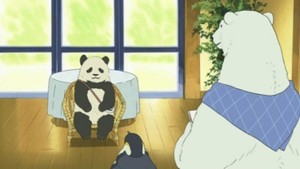
Polar Bear's Café
Rating: 3 ½
Review: The title makes it sound like Polar Bear's Café is about a polar bear that runs a cafe. Which is exactly right. Thank you truth in advertising. The polar bear in question is named Polar Bear. He likes puns and runs a nice, slightly overworked cafe. His cafe is discovered one day by a lazy panda named Panda. Panda is looking for a job, but can't find one that lets him laze around and eat bamboo which he readily admits are his only skills. He interviews for a wait-staff position at Polar Bear's place but is told in no uncertain terms that he won't do. Polar Bear instead hires a cheerfully industrious young woman and Panda keeps looking for employment. He goes to the zoo, where he finds the perfect job: part-time panda.
Anthropomorphized animals generally signal children's entertainment, but Polar Bear's Café isn't really aimed at kids. Sure kids will like the cute and surprisingly realistic animals and the occasional antic, but it's too slow and wry to be primarily aimed at them. Even adults will have trouble getting into it at first. It's so laid back that it initially comes across as boring, and it doesn't help that the first part of the episode focuses entirely on Panda, who acts so blithely entitled that you want to spank some responsibility into him. At that point the series' main asset is its look, which is beautifully colored and textured—especially the animals.
It isn't long, though, before the series' other charms begin to show. There's a subtle, surreal humor to its matter-of-fact mingling of humans and animals, a humor that occasionally builds to genuinely hilarious heights. Panda's first job interview, during which he competes for employment with a badger, a mandrill, an anteater and a giant tortoise, is probably the best such moment, a dry demonstration of why animals would make terrible employees. Armed with such humor, the series ceases to be a lyrical waste of time and becomes a rather delightful diversion. A taste for meandering slice-of-life humor is a must, but if you have it you'll have a fine time.
Polar Bear's Café is available streaming at Crunchyroll.

Rock Lee & His Ninja Pals
Rating: 2
Review: An SD gag show starring perhaps the goofiest side-character in all of Narutodom? What could possibly go wrong? If you're at all interested in this show, then you know how it goes: Rock Lee is a ninja from Hidden Leaf Village who can't use ninjutsu. He's a bushy-browed, straight-shooting idiot with an inflexible moral code and an indomitable will to improve. He's devoted to his friends, considers Naruto a valuable rival, and is smitten with Sakura. And he spends most of his time, if this show is to be believed, dodging dog poop and making a fool of himself. In the first half-episode he helps out a little girl who's dad has gotten in deep with the world's dorkiest loan sharks. In the second he competes with Naruto for a cake voucher. Much fool-making ensues.
But not much funny-making. The series' first and biggest problem is that it just isn't very funny. To be sure it has its moments. There's a bit with Rock Lee and a bikini in the second half that's pretty amusing, and the recurrent dog poop bit actually gets better each time it's repeated. But that's hardly worth sitting through twenty-five minutes of annoying antics, failed self-referential riffing, and barely-humorous violations of filmmaking form for. The series treats the mother show with such winking reverence that it never once truly works as a parody. Parody requires a healthy disrespect, a streak of mean, even it's loving meanness. Without it, the jokes about the franchise are just indulgent back-patting. That applies to nearly all of the jokes, which avoid even the barest hint of mean-spiritedness, and thus avoid all but the most basic kinds of humor. Thus the success of its bikini gags and dog-poop jokes. Even Rock Lee fans will want to avoid this comedic crap-shoot. Rock Lee was a great character because he looked and acted like a goober but was strong and cool in a fight. This is all goober and no cool. No one wants to see that. Especially not Rock Lee fans.
Rock Lee & His Ninja Pals is available streaming at Crunchyroll.

Zetman
Rating: 2 ½
Review: Adapted from the manga by Video Girl Ai's Masakazu Katsura, Zetman wants to be a dark and dangerous superhero story, the kind that complicates heroism with inner torment and unflinching nastiness. It kind of forgets, though, that real complexity requires quality plotting and characters. In what one assumes is the future, monsters have been engineered to fight each other for the amusement of the rich and gross. One day the monsters achieve sentience and escape, killing most everyone in the arena. Only two scientists escape, one with an engineered baby. Ten years later the baby has grown into a feral child named Jin. Jin hangs with a wannabe hero named Kouga and lives in a homeless community with his "grandfather." When his grandfather is killed by a monster masquerading as a serial killer, Jin is taken in by a kindly sex worker named Akemi. When Akemi is threatened by the same monster, Jin explodes, displaying powers far beyond those of a human.
Somewhere in this mess of self-conscious human ugliness and shoddy emotional manipulation lie the seeds of a pretty decent superhero series. The rivalry that is obviously building between wild, impoverished Jin and rich, idealistic Kouga has some promise, especially since the next episode preview promises that they'll soon be young adults engaged in violent superheroism rather than annoying kids playing at being defenders of justice. It also displays a real aptitude for hard-hitting, tightly-choreographed super-violence, as well as too-cool superhero posturing—the latter helped mightily by Katsura's typically superb character designs. It isn't much, but a lot of good action series have been built from less.
Unfortunately, most of them also had some rudimentary storytelling skills. Zetman has zero grasp of pacing, no knowledge of how to dress up clichés, and doesn't seem to understand the role of audience investment in action and drama. When it does try for investment, it always pushes too hard—which is a shame, since the parts with Jin and his surrogate mother would be pretty involving if left to their own devices. Maybe it'll work all of that out, but don't hold your breath.
Zetman is available streaming at Viz.com.
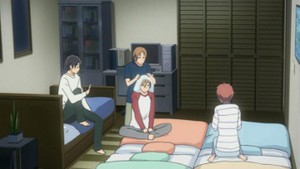
Kimi to Boku 2
Rating: 3
Review: The second season of Kimi to Boku begins where the first left off. Not that you'd know it from this, and not that it matters one whit. Kimi to Boku has very little in the way of plot, so as long as you're familiar with the characters and their dynamics you'll get everything this episode has to offer. Which is mostly a lot of boys chatting and goofing off. On a normal winter's day Shun, Kaname, Yuki, Yuta and Chizuru share some tangerines on the school steps. Shun decides that he should give some of the tangerines—his family got a glut of them from a relative—to Kaname's mother, who has occasionally looked after the boys. Naturally everyone else wants to come along and the whole thing turns into a slumber party, much to Kaname's annoyance.
If you haven't seen Kimi to Boku's first season this isn't the place to start. Not because you wouldn't understand what's going on. It's all too easy to understand: it's just a lot of high-school friends doing ordinary day-to-day stuff. There are some relationships that it helps to have the history of, but they don't appear here. Rather, this isn't the place to start because this doesn't show the series off to best effect. In fact, this episode basically includes everything that is wrong with the series. It is sticky sweet, terminally slight, basically directionless, only mildly amusing, and ultimately pointless. It also flaunts the cast's fundamental problem, namely that its high-school boys act like high-school girls. And cutesy, idealized ones at that. I'm not sure even high-school girls have gossipy sleepovers like Shun and the crew do; I know high-school boys don't.
Even at its worst, though, Kimi to Boku remains a warm, comforting and thoroughly harmless diversion. Maybe they don't behave like real boys, but Shun and the rest are good company. And though you wouldn't know it from watching this episode, they do have outside relationships that lend the series an occasionally surprising depth of feeling. Something that, if the preview is anything to go by, the next episode will set about proving.
Kimi to Boku 2 is available streaming at Crunchyroll.

Hiiro no Kakera
Rating: 2
Review: Ah, the reverse harem show: like butler cafes and yaoi, proof positive that—at least where otaku sexual obsessions are concerned—anything that goes for men goes for women too. And that includes the awfulness of their harem shows. Apparently normal teen Tamaki Kasuga is on her way to her grandmother's village when she first encounters a god. It doesn't much look like one: it's a white blob with tiny stick legs. But apparently that's what it is. That's also what the slime monsters that assault her seconds later are. She's rescued by a handsome, blunt young man who then escorts her to her grandmother's. It is there that she learns that she isn't a normal teen. Her bloodline has long protected the powerful artifact enshrined at her grandmother's shrine, and she is set to inherit the role. To protect her from harm or exploitation, the allied Shugogo clan sends her four beautiful, gifted men as bodyguards—among them the young man who rescued her.
It isn't so much that Hiiro no Kakera is horrible or painful; it's just that it's dull and colorless and completely devoid of interest. Tamaki is almost entirely without personality beyond her innocent girl exterior, and her stable of man flesh is given one trait apiece and expected to play it for it's worth. There's the blunt guy, the kind guy, the spacey guy, and the hot -tempered guy. Given the name of the group sent to protect her—the Five—there's bound to be one more, but it's highly unlikely that he'll be any more interesting. Tamaki's other classmates are painful clichés, her grandmother is a matriarchal placeholder, and about all you can say about the other shrine maiden is that she's female. As for the magic n' mysticism setup, it's generic to the point of meaninglessness, with the usual nonsense about a magical maguffin and restless gods and demons and what have you. It's all about as tired and boring as it possibly can be. Even the handsome character designs and lovely setting seem drained of all color.
Hiiro no Kakera is available streaming at Crunchyroll.
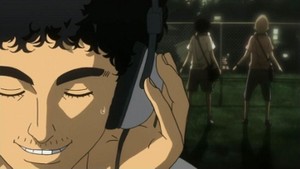 Space Brothers
Space Brothers
Rating: 4 ½
Review: Space exploration has inspired its share of anime series, from manly-man dreck like Moonlight Mile to the salarymen-in-space drama of Planetes. The successful ones capture the wonder of space travel and the grandeur of the exploratory urge. The great ones tie them in with the dreams and feelings of the men and women striving out into the cosmos. It may be too early to tell, but Space Brothers feels like one of the great ones.
Mutta and Hibito Nanba are brothers. Mutta is the older, Hibito the younger. Late one night the young pair are mesmerized by what to all appearances is an alien craft hovering above their town. Hibito vows on the spot to one day follow it to the moon. Mutta, convinced that an older brother should always be one step ahead of the younger, declares that he'll travel to Mars. Flash forward nineteen years. Hibito is a NASA astronaut in training to be part of the first long-term habitation of the moon. Mutta is an automobile engineer who has just been fired for head-butting his boss. A gentle nudge from Hibito reignites Mutta's old ambition, but Mars is a long way away—especially for a perpetual screw-up.
Amongst the space-oriented series out there, on a purely structural level Space Brothers is probably closest to Twin Spica. Both are about childhood dreamers striving to pass a rigorous (one assumes) astronaut selection process. That's where the comparison ends. From the opening montage, during which Mutta marks the course of his life according to notable sporting disasters, Space Brothers has an offbeat humorous rhythm that is pretty much totally unique. The series captures the allure that heavenly bodies have for earthbound boys—particularly during the UFO scene—and already has its finger the button that stirs the explorer's soul even in the sedentary, but it's also seated firmly inside Mutta's afro-encased, smart-mouthed head, so it never gets dull or didactic. It's a show about the childish pursuit of dreams as seen through the eyes of a jaded adult, which allows it to be a bit sad and even touching without ever forgetting to be really funny.
Space Brothers is available streaming at Crunchyroll.
 Folktales From Japan
Folktales From Japan
Rating: 3
Review: What is a series called Folktales From Japan about? Maybe Japanese folktales? This episode is divided among three folktales. In the first an old woman and an old man fish a box out of the river in which they find a beautiful white puppy. The puppy grows into a splendid dog that eventually leads them to a fount of gold coins. When the dog fails to do the same for their greedy neighbors, the neighbors kill it. Though dead, the dog continues to bring the old couple fortune, first as a wooden vessel and then as ashes, while the neighbors' greed eventually gets them sent to the stocks. In the second a young merchant buys a dream from an older colleague that he believes will lead him to fortune. After many seasons of honest service the dream comes true and the young merchant reports the fortune to his employer and is rewarded with happiness and success. In the third a swindler posing as a monk teaches an old woman a fake sutra and over the years re-encounters her several times and is eventually swayed by her innocent goodness into turning his life around.
There is nothing to Folktales From Japan that its title doesn't tell you. These are obviously the kind of simple morality plays told to children over the generations to instill in them qualities of humility, kindness, generosity and reciprocity. They are presented with minimal effort in a deliberately simple storybook fashion: childish designs, simplified settings, kindly, all-knowing narrator. This is a series obviously intended for consumption by children, and would doubtless be of interest to curious tykes looking for fairy tales beyond the Brothers Grimm and Hans Christian Anderson. Of course, in America, they'd also have to be able to read English or understand Japanese, which kind of eliminates most of them. Instead the series is most likely to appeal to older fans looking for a greater understanding of Japanese culture. At three tales a pop, these episodes are a pretty good deal for such viewers. Viewers looking for pure entertainment, on the other hand, will get pretty roundly stiffed.
Folktales from Japan is available streaming at Crunchyroll.
discuss this in the forum (1032 posts) |
this article has been modified since it was originally posted; see change history
back to The Spring 2012 Anime Preview Guide
Season Preview Guide homepage / archives